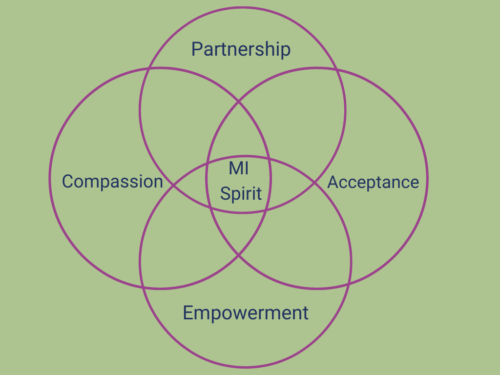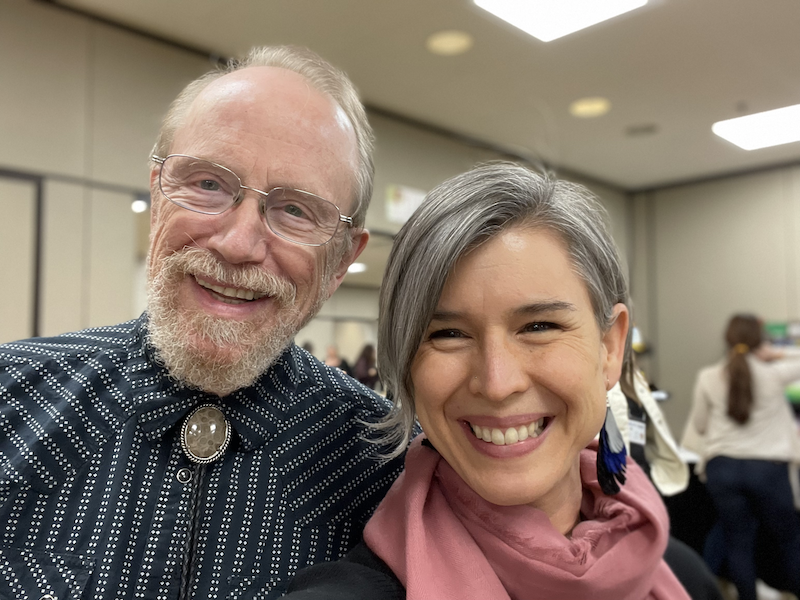How Motivational Interviewing Works: The Spirit of Compassion in MI

This is part 1 in a series of 4 ‘deeper dives’ into how motivational interviewing works, beginning with the spirit of motivational interviewing.
Just what is the Spirit of Motivational Interviewing?
The new MI book shares, “MI involves not only particular skills, but also an underlying attitude, a particular state of mind and heart with which you engage in a helping relationship” (p.6)
The spirit of MI is the attitude we bring to the work with our clients. It’s about our heartset and mindset as providers.
When we look at how motivational interviewing works, it all begins with the spirit. Here are the four components of the spirit of motivational interviewing:

Spirit of Motivational Interviewing
And here’s what we know, from research and from experience: the attitude, heartset and mindset of the provider (YOU) impacts client outcomes. It impacts the feel of the session, the experience your client has with you, & the progress a client can make.
The new MI book defines the spirit element of compassion as “an intention to give top priority to the health and well-being of the one you are serving.” Compassion in MI means our intent is to alleviate suffering and support positive growth.
It means we are always working in the best interest of the client. MI is compassion in action. This is how motivational interviewing works.
The Latin root for the word compassion is ‘pati,’ which means ‘to suffer,’ and the prefix ‘com’ means ‘with.’ Compassion, originating from compati, literally means ‘to suffer with.’ One participant shared the etymology of “com” is calm, so originally the word compassion meant “to be calm with suffering.”
Each of us has an internal experience of compassion for our clients. We also have an outward expression of compassion.
In my advanced MI class, we are taking a deeper dive into the inner experience and outward expression of each of the elements of the spirit of MI.
I wanted to share with you the brilliant notes my advanced cohort came up with!
Inner Experiences of Compassion: Keeping judgment at bay; desire to be WITH the client; genuine interest; humility; awe of client; loving presence; being 100% ‘all in’; feeling peace in the present moment; focused.
What would you add to your inner experience of compassion? I invite you to consider for a moment, what gets in the way of you experiencing compassion with a client? Then, consider what helps you re-ground into compassion?
Outward Expressions of Compassion: Deep & active listening; open hearted listening; being present & not distracted; being with client without fixing; matching energy; patience; good body language, eye contact, & nodding indicating listening; staying on track with agenda; reflective listening; curiosity via questions; accurate empathy not sympathy; silence.
How do you demonstrate compassion with your clients?
Motivational Interviewing Tip of the Week: How does motivational interviewing work? It begins to work, first and foremost, with YOUR heartset and mindset. What is your inner experience of compassion with your clients? How do you demonstrate a compassionate presence with your clients? For many, it means being wholly present, listening deeply with curiosity, staying out of judgment, and keeping their best interest at the forefront of all you do.
Related Posts

Motivational Interviewing Miller & Rollnick! Here’s what’s new!
The name “Motivational Interviewing” seems like a less-than-fitting name for what it actually is. For years, even as a trainer, I struggled with the name Motivational Interviewing.“Motivational” makes me think of motivational speakers, cheerleading, and motivating...
Related Posts

Wrestle with yourself so you don’t wrestle with your client!
With Motivational Interviewing, we often say, "We are dancing, not wrestling". Imagine the metaphor of wrestling with your client-- pushing, pulling, persuading, trying to make a change happen. Exhausting! But using Motivational Interviewing is like dancing. MI is...

Let’s Learn Together!
Hi, I’m Hillary Bolter. At MI Center for Change, Motivational Interviewing is our passion. Motivational Interviewing will help you become more effective and efficient as you support clients’ change!

